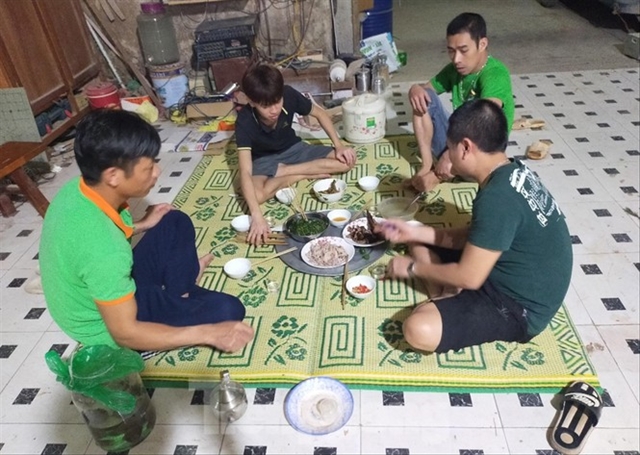 Society
Society

A lot of young ethnic people living in mountainous remote areas like Lan have recently headed to the cities, bringing not only positive changes but also negative impacts to the ethnic community.

|
| A meal at a rented house in Hà Nội of young ethnic people from Sơn La Province. — Photo tienphong.vn |
SƠN LA — Quàng Thị Lan works at an industrial park in the northern province of Bắc Giang, where she earns VNĐ10 million (US$440) per month, including overtime and bonuses.
Her salary is the equivalent of what her family makes growing rice and corn in a small ethnic village.
That’s why the girl from the Thái ethnic group decided to leave her village in the northern mountainous province of Sơn La seven years ago when she was 19 years old to work in the city, hoping for a better life.
“I am now the breadwinner for my family. I can also save money to build a new house. Many people from my village want to work in industrial parks as well,” she told Tiền Phong (Vanguard) newspaper.
Many young ethnic people living in mountainous remote areas like Lan have recently headed to the cities, bringing not only positive changes but also negative impacts to the ethnic community.
According to the National Assembly’s Committee of Ethnic Affairs, those from ethnic minority groups account for more than 55 per cent of the total number of poor people nationwide.
Since last year, more than ten of Lan’s cousins in Mường Bám Commune have left the village to work with her.
Thân Đức Thí, the owner of a rented house complex where Lan and her cousins stay in Bắc Giang Province, said there had been an influx of ethnic minority workers from northern mountainous provinces to the area. Before 2017, most workers were from lowland areas, but now 70 per cent of his guests were ethnic people.
Lò Văn Sâm, chairman of Tông Lạnh Commune, Thuận Châu District, Sơn La Province, said last year about 600 local people moved to the cities and industrial parks. Each of them earns between VNĐ5 million and VNĐ7 million per month, and many can afford to buy expensive items for their families and build new houses now.
“The positive thing is that we have a generation of young people who dare to take action to improve their lives,” he said.
Quàng Văn Kiến and his wife are an example.
In 2014, Kiến moved to downtown Sơn La Province, then Hà Nội and Lâm Đồng, and worked for aluminium and glass door stores while his wife was hired to sew clothes.
Two years later, after learning how to do their jobs, they returned to their village to open their own stores.
Last year the couple earned VNĐ400 million and plan to open more shops in downtown Sơn La.
Chairman Sâm said thanks to the number of young people heading to the towns, local people were less dependent on authorities.
Dark side
Most young people have moved to the cities, leaving only old people and children behind in the villages.
60-year-old Lường Văn Dương and his wife have to take care of ten grandchildren while his sons and daughters are working in the cities. Some of them only visit home once or twice a year.
Dượng is worried that his grandchildren lack attention from their parents.
“Many of my grandchildren are reaching puberty with a lot of changes to their physical and mental health. I am worried that without their parents, they will be influenced by social evils.”
Living in a small house nearby, Quàng Văn Buôn, 80, feels empty as most of the family members have left.
The old man feels tired having to care for his paralysed wife and raise a grandchild without support from his sons and daughters.
Lý A Phao, an ethnic migrant worker from Mù Căng Chải, Yên Bái Province, said ethnic minority people working in the cities are like Vietnamese working overseas in the Middle East or East Asia countries. They face risks like language barriers, scams and being exploited. Young ethnic people are also easily lured by temptations from social evils.
Bùi Văn Lịch, head of the Ethnic Policy Department at the National Assembly’s Committee of Ethnic Affairs, said the large-scale migration from the mountains to the cities had not been fully reviewed by management agencies.
“We are following the migration to prepare a socio-economic development programme for ethnic minority people for 2021-30 and a national target programme to be submitted to the National Assembly in May. This will serve as a foundation to approve new policies to offer more training and job orientations for them,” he told Tiền Phong. — VNS




